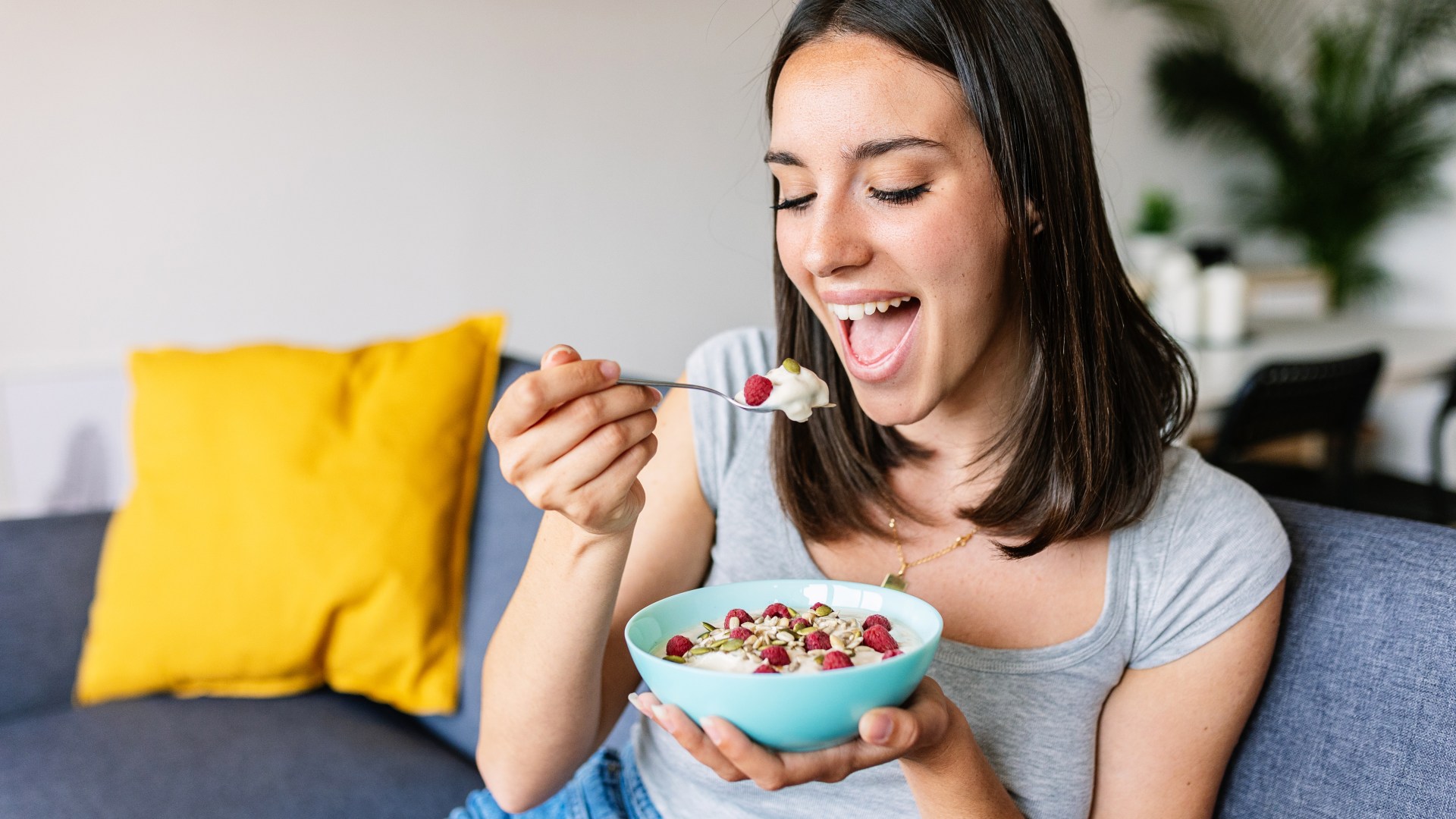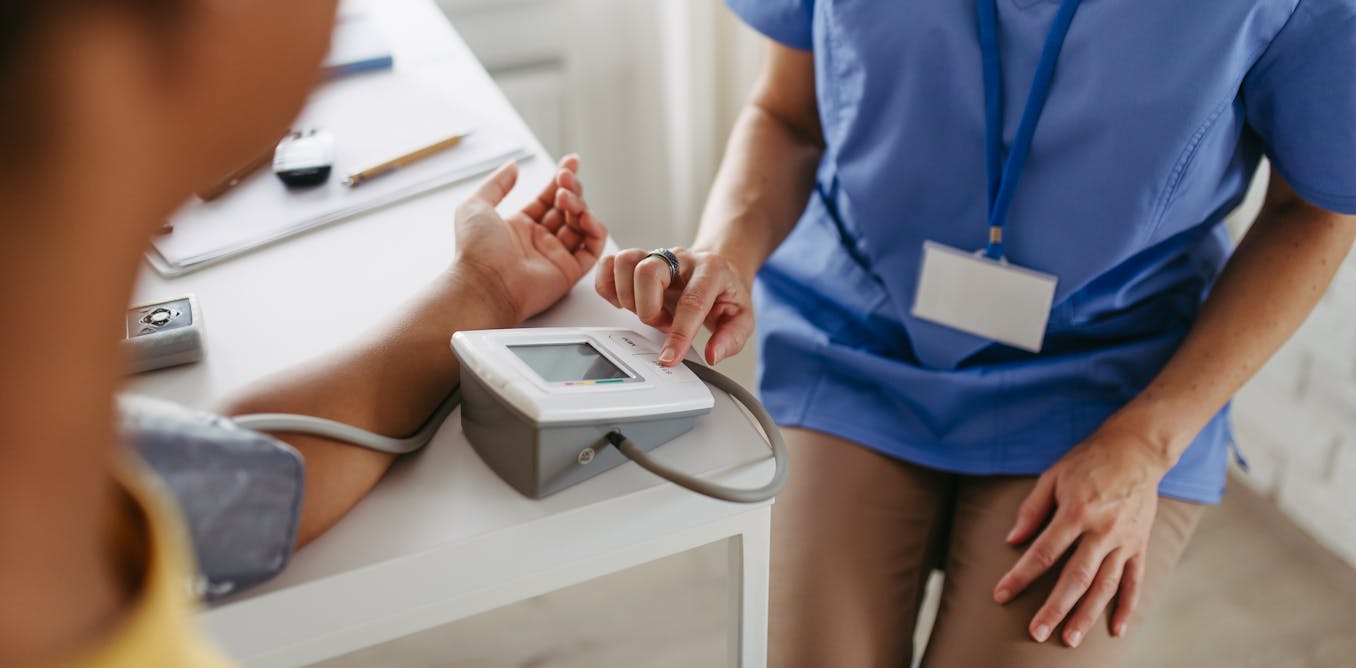EATING less can help you lose weight and maybe live longer.
A study published last week found that mice eating restricted diets lived the longest – 34 months compared to 25 for those scoffing whatever they pleased.
6

6
And it’s not just rodents – National Institutes of Health scientists found in 2023 that when 200 people cut their calories by 12 per cent for two years, they showed DNA changes that suggested they were ageing more slowly, and their risk of early death was slashed by up to 15 per cent.
But it’s tricky to keep calories down if your belly never feels full. A croissant for breakfast and a bowl of lettuce or soup for lunch is likely to leave you hungry.
Luckily, there are ways you can feel full without having to eat more. Dr Aileen Alexander, founder of online coaching firm Nourish, tells Lucy Gornall how to fill up while consuming fewer calories . . .
SIZE MATTERS
OPT for a smaller plate than usual — research has found it’s associated with higher satiety and a smaller intake of food.

6
Dr Alexander says: “When the same portion size is placed on a small plate instead of large, it appears larger, making you feel satisfied without the sense of restriction or deprivation.”
When looking at your plate, around one-quarter should be protein, which is the most satiating macronutrient.
Dr Alexander says: “Protein slows digestion and reduces hunger hormones while increasing the hormones that make us feel full.
“Chicken, white fish and tofu are highly satiating.”
A quarter of the plate should be complex carbohydrates, such as quinoa, brown rice, or sweet potato, and the last half non-starchy vegetables. Add a small amount of fat such as avocado, olive oil or cheese.
ADIOS AMIGOS
LOVE a sharing banquet when you’re out for a meal with friends? We’ve got some bad news for you.
“Tapas-style dining often involves small portions of highly palatable fat-rich foods,” Dr Alexander explains.
The small, frequent servings can trick the brain into thinking you’re not eating as much as you are. This makes it easy to consume more calories without feeling full.
“It’s also difficult to know how much you’ve eaten because you’re sharing from a plate whilst chatting with others, instead of being able to visualise your full meal on a single dish at the beginning.”
HYDRATION STATIONS
BEFORE sitting down to eat, or looking in the fridge for a snack, drink a glass of water.

6
Research has found that drinking water before a meal could help you feel fuller and therefore cause you to eat less during that meal.
Dr Alexander says: “Often we will mistake thirst for hunger, so drinking water before or with a meal will help.
“It also distends the stomach, creating feelings of fullness.” You could add chia seeds to your water — a trend which is seen on TikTok.
“They are high in fibre which also promotes satiety,” Dr Alexander says.
SNACK ATTACK
STILL hungry despite snacking on sweets, cakes, crisps and biscuits?
These foods tend to be made from a combination of saturated fats and simple carbs — the type that are broken down and absorbed quickly.
This leads to a blood sugar spike followed by a crash, leaving you feeling hungry again shortly after.
Dr Alexander says: “These foods are ultra-processed and provide instant gratification. Yet they are low in protein, fibre, and healthy fats, which are the components that help to signal fullness.”
So, go for complex carbs, proteins and healthy fats, such as a quarter of an avocado spread on two oat cakes.
WHAT A WHIFF
MOST of us know we should eat more slowly, although this is painstaking.
But it takes about 20 minutes for your brain to receive the signals that you are full, says Dr Alexander.
Going for strong-smelling food may be the answer, after a Dutch study found you’re more likely to take smaller bites of food that has a strong aroma.
The study suggested that each bite could contain between five and ten per cent less food than usual.
Even strong but pleasant smells, such as from desserts, had the same effect.
So, make sure to stock up on plenty of smelly foods such as hard-boiled eggs for breakfast, a mackerel salad or stinky cheese for lunch and salmon for your evening meal.
THE F-WORD
THE average Brit is eating below the recommended 30g of fibre per day, according to the British Heart Foundation.
Yet as Dr Alexander explains, “fibre is a critical component of feeling full”.
She adds: “Fibre is the indigestible part of plant foods, slowing digestion.”
Slower digestion makes us feel fuller for longer — and your bowels will be more regular. Up your intake with fruits and vegetables at each meal, as well as whole grains.
Dr Alexander suggests swapping white rice and pasta for their brown counterparts, white bread for wholegrain bread and sugary cereals for oats or wholegrain granola.
MINTY FRESH
MUCH of the time, it’s your emotions driving hunger, when really your stomach is full.

6
To distract your brain, try chewing on sugar-free gum.
A small study published in the journal Appetite found that when people chewed gum after breakfast they felt less hungry at lunch.
As a result, scientists found they ate less pasta (41g, 68 calories).
You could also try brushing your teeth after eating a meal, to prevent sweet-tooth cravings from kicking in.
But it’s advised to brush teeth 30 minutes after eating to avoid damaging tooth enamel.
START SMART
HAVE a starter before your main meal, whether at a restaurant or home.
Dr Alexander advises: “Start off with a salad or a broth-based soup. These are high in volume but low in calories, helping to fill your stomach before the main meal arrives.”
Miso soup sachets sold in the supermarket are quick to make and low-calorie.
Or, you could make a ratatouille or a big bowl of salad to take servings from throughout the week.
BULK UP
VEGETABLES are a must for filling your stomach without the hit of lots of extra unnecessary calories.

6
Dr Alexander says: “They are packed with fibre and water, which stretch the stomach and activate stretch receptors, signalling fullness to your brain. They are also packed with vitamins and minerals which are essential for a healthy diet.”
Vegetables that are easy to throw into almost anything include mushrooms, tomatoes, spinach and courgette.
Or buy a frozen bag of mixed vegetables to keep costs low, and mix it up each week.




